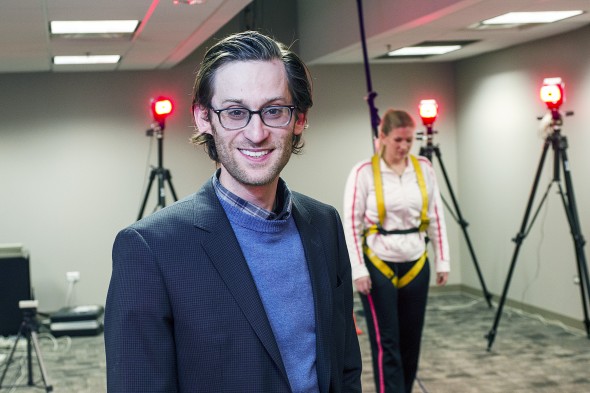Helping older adults, prosthetic wearers find balance

Noah Rosenblatt’s research helps prevent falls. “We teach people how to catch themselves once they start falling,” says Rosenblatt, visiting clinical assistant professor of kinesiology and nutrition. — Photo: Joshua Clark
Two groups of people are more at risk of falling than the rest of us: older adults and those who wear prosthetic legs.
Research by Noah Rosenblatt is aimed at keeping these folks upright.
One of his studies looked at motorized feet. “If you’re missing an ankle, they flex the foot, and can sense where you are in your gait cycle to keep the toe from catching the ground,” said Rosenblatt, a visiting clinical assistant professor of kinesiology and nutrition.
Another of his studies examined a different technology — a vacuum suspension system. “The stump goes into the socket like a foot into a shoe,” he said. “The device stays on the leg by sucking all the air out between the limb and the socket.
“It’s supposed to make the user more comfortable and enable them to achieve faster walking, like tying your shoe tighter to avoid getting a blister.” The system improves balance and helps prevent falls. Newer devices provide evidence for clinicians to prescribe them, and for insurance coverage.
Fall prevention is a continuation of the work with older adults by kinesiology professor Mark Grabiner. “We teach people how to catch themselves once they start falling,” Rosenblatt said.
When he started at UIC seven years ago, he helped train a group of women, starting from the fact that women are at higher risk than men of falling, and breaking bones. The women were given four hour-long sessions and compared with a control group that received no training.
“The trained group reduced the risk of falling due to trips by 50 percent,” Rosenblatt said. “Now we’re trying to see whether we can improve on that.”
Trips account for one-third of falls. “In the future we’ll deal with slips,” as on ice, he said. Another concern with older adults is preventing losing one’s balance. “We look at how we control our balance when we walk, our gait patterns,” Rosenblatt said.
There are vacuum suspension systems for both above-the-knee and below-the-knee prosthetics wearers. “Below the knee there are more bony areas,” he said. “Above the knee there are not as many bones, but a lot of tissue that needs to be kept in place.”
Rosenblatt grew up in Bellmore, New York, on Long Island. He earned a bachelor’s degree at Northwestern University and a Ph.D. at Boston University, both in biomedical engineering. Then he did postdoctoral work at UIC before starting work full time.
Rosenblatt enjoys running. He’s done marathons, and most workdays he runs from his lab to the Ogilvie Transportation Center.
Cooking is another interest. “I follow the recipe the first time, then I either add or swap out ingredients I think should have been there,” he said.
He lives in Evanston with his wife, Emily, a program manager in advanced analytics and cognitive computing for IBM. They met on their first day at Northwestern. “My freshman year roommate knew her freshman year roommate,” he said.
The Rosenblatts are quite the travelers. They recently returned from Italy, and have been to China, Vietnam, Cambodia, Finland, Russia, Spain, Canada, Mexico and Peru, where they swam in the Pacific Ocean with hundreds of sea lions.
“We climbed active volcanoes in Guatemala and roasted marshmallows over lava flows,” he said. “My favorite country was Iceland, where we wore dry suits and snorkeled in glacial water along the Continental Divide and explored ice caves.”
